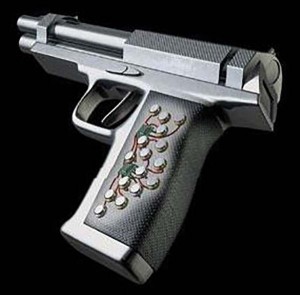by Joseph P. Tartaro | Executive Editor

The Dynamic Grip Recognition (DGR) smart gun shown was a project of the New Jersey Institute of Technology’s (NJIT) that received $2 million several years ago, but has apparently gone nowhere. The main idea was that the grip would have 32 pressure sensors to record the owner’s unique hold.
There’s still no reliable, foolproof firearm with user recognition technology, referred to in the media and legislative chambers as a “smart gun” after decades of lab work, testing and political wrangling, but the dream lives on. It is fostered in part by a foundation conceived and largely funded in California’s Silicon Valley.
It’s called the Smart Tech Challenges Foundation and has the sole mission to promote exploration of the most advanced technologies to create guns that would be “safe” by providing financial incentives to individuals and companies that can create, produce and market firearms that will only fire in the hands of their owners.
It was founded in January 2014 by Silicon Valley angel investor Ron Conway to spur firearms safety through high tech commerce, planning to dole out cash and grants to “fund innovations that help gunowners control who can access and/or shoot their firearms.”
“We’re hoping that the winner turns into a company that we fund and we have a Mark Zuckerberg for gun safety,” said Conway after a San Francisco news conference announcing the challenge.
Conway and other valley entrepreneurs, formed the group in response to the 2012 mass shooting at Sandy Hook Elementary School in Connecticut.
“Let’s use innovation to bring about gun safety,” Conway said. “Let’s not rely on Washington.”
The Nov. 2 broadcast of CBS’ “60 Minutes” featured a segment on smart guns with two of the inventors demonstrating and explaining their systems for application on handguns as well as shotguns.
Featured on the show in interviews with Leslie Stahl besides Conway were some Smart Tech grantees, such as Jonathan Mossberg and Tom Lynch, who demonstrated their technologies, Steve Sanetti, president of the National Shooting Sports Foundation (NSSF), the trade association for the firearms and ammunition industry, and New Jersey State Sen. Loretta Weinberg, the original sponsor of the Garden State’s legislation mandating the sale of smart guns.
Sanetti answered questions from Stahl and explained that the industry does not oppose the development of authorized user technology for firearms but that caution is warranted.
“We have to be careful not to fall into the technology trap,” Sanetti said. “We’re not here saying that technology is a bad thing. Technology obviously improves our life in many ways. But I think you have to look at firearms in a slightly different way. Their mechanisms are the way they are over centuries of development. They’re at the state now that consumers want them and, in the United States, there’s a lot of tradition involved in firearms.”
Sanetti noted that all of the user recognition systems currently under consideration rely on batteries, and that batteries do wear out and fail.
Sanetti also explained that laws mandating “Smart Gun” technology as already passed in New Jersey and California, which the industry opposes, would punish the vast majority of responsible gunowners who as a matter of course secure their weapons safely away from children or others who should not be able to access them. Indeed, all guns can be secured today by means of the locks furnished by their manufacturers, or by the 37 million free locks distributed by the NSSF’’s Project ChildSafe, without the reliability disadvantages posed by “smart guns.”
“Why are you trying to take my firearm and add something to it that’s going to make it more prone to failure?” he asked, referring to the possibility that the technology might malfunction.
Perhaps the only new information to be covered in the 60 Minutes segment came from Sen. Weinberg, who said that she would introduce legislation to repeal that state’s current unenforced law if firearms retailers, in return, would all agree to carry at least one model of an authorized user equipped firearm in their stores’ inventory.
The way the Garden State law was originally written, it became effective as soon requiring that only smart guns could be sold in the state as soon as they were commercially available anywhere in the country.
Gunowners and organizations such as the National Rifle Association and NSSF have opposed the mandates legislated in New Jersey and California, and proposed elsewhere, although accepting the concept of the smart guns being offered as a choice for consumers.
There is currently a lawsuit challenging the California law which originally was to take effect in 2010, but has only recently been activated on order of state Attorney General Kamela Harris.
Also discussed on 60 Minutes was the consumer backlash when a few firearms retailers first offered the Armatix pistol as just another item in the showcase because it would have triggered the New Jersey mandate law, excluding all other guns.
Weinberg’s new proposal allegedly would still focus on smart guns but leave the choice to the consumer.
San Francisco Police Chief Greg Suhr, a vocal advocate for stronger gun control laws, and a proponent of smart gun legislation, was also interviewed by Stahl.
It is worth noting that there was some balance to the CBS show besides the appearance of NSSF’s Sanetti. At various points during the demonstration of the smart guns, Stahl asked many questions regarding the reliability of smart guns and posed questions related to their adoption by law enforcement and average citizens.



